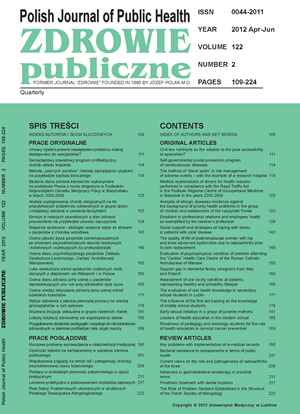Leaders of health education in the modern school
Keywords:
health education, leaders, teachersAbstract
Introduction. Only a teacher, who enters into the role of a charismatic leadership personality may effectively pursue the process of health education in school.
Aim. Knowing teachers’ views – teachers of different specialties – on the leaders in health education in Polish schools was the main object of this research.
Material and methods. There research comprised 307 teachers from 37 schools of different types. All teachers were from the Opole Province and teaching different subjects. A diagnostic survey, using the author’s questionnaire, was chosen as the method of research.
Results. The research showed that the examined teachers could see the link between physical education and health education and they recognized the significant role of educators in the process of shaping a healthy lifestyle. In the opinion of the researched group the teachers of biology and physical education are best prepared to be the leaders of school health education – most often the biology teachers, in the second place – physical education teachers. As many as 30% of the respondents do not see the leader of health education in their school. It is a worrying situation especially when the Ministry of Education made the physical education teacher responsible for this task.
Conclusions. Making changes in education system of future teachers of physical education and training for currently working teachers – towards gaining leadership of health education competence, is urgently needed.
References
1. Demel M. O wychowaniu zdrowotnym. Warszawa: PZWL; 1968.
2. Krawański A. Prozdrowotnie zorientowana edukacja fizyczna elementem kształcenia ogólnego. Zdrowie – Kultura Zdrowotna – Edukacja. 2010;5:83-8.
3. Kosiba G. Instytucjonalne formy doskonalenia zawodowego nauczycieli wychowania fizycznego. Rozprawy Naukowe AWF we Wrocławiu. 2009;28:263-8.
4. Raport o Kapitale Intelektualnym Polski. Dokument ekspercki sporządzony przez Zespół Doradców Strategicznych Premiera. Warszawa;10 lipca 2008.
5. Wiśniewska-Śliwińska H. Głos w dyskusji nt. najnowszych trendów edukacji zdrowotnej. Probl Hig Epidemiol. 2010;91(2):335-7.
6. Woynarowska B, Sokołowska M, Szymańska MM, Burzyńska I, Pułtorak M. Struktura dla tworzenia szkoły promującej zdrowie. In: W. Wrona-Wolny, B. Makowska (ed). Wypisy z wychowania zdrowotnego. Kraków: AWF; 2002. p. 337-43.
7. Eales-White R. How to be a better leader. London: Kogan Page; 1998.
8. Krawański A. Nauczyciele wychowania fizycznego w procesie społecznej edukacji prozdrowotnej. Wychowanie Fizyczne i Zdrowotne. 1996;2:53-8.
9. Drabik J (ed). Pedagogiczna kontrola pozytywnych mierników zdrowia fizycznego. Gdańsk: AWFiS; 2006.
10. Ratamess NA, Faigenbaum AD, Hoffman JR, Kang J. Self-Selected Resistance Training Intensity in Healthy Women: The influence of a personal trainer. JSCR. 2008;22(1):103-11.
11. Janicki G. Nowe aspekty czasu wolnego na przełomie wieków. In: Z. Dziubiński, K. W. Jankowski (ed.) Kultura fizyczna w społeczeństwie nowoczesnym. Warszawa: AWF; 2009. p. 380-91.
12. Cendrowski Z. Lider w działaniu. Warszawa: Promo-Lider; 1996.
13. Cendrowski Z. Przewodzić innym. Warszawa: Promo-Lider; 1997.
14. Kowalski M. Nauczyciel wobec medialnych działań na rzecz wartości zdrowia. In: K. Denek, K. Zatoń, A. Kwaśna (ed). Edukacja jutra. Wrocław: AWF; 2008. p. 135-41.
15. Huk-Wieliczuk E, Marcinkowski JT. Uczelnie wyższe wychowania fizycznego wobec aktualnych potrzeb edukacji zdrowotnej. Probl Hig Epidemiol. 2009;90(4):470-6.
16. Romanowska-Tołłoczko A. Styl życia studentów oceniany w kontekście zachowań zdrowotnych. Hygeia Public Heath. 2011;46(1):89-93.
17. Madejski E, Majer M, Adamczyk A. Aktywność ruchowa nauczycieli wychowania fizycznego w aspekcie zdrowego stylu życia. Oczekiwania – stan rzeczywisty. Rozprawy Naukowe AWF we Wrocławiu, 2009;28:277-81.
18. Pośpiech J. O reformowaniu wychowania fizycznego – refleksje zamiast polemiki. Zdrowie – Kultura Zdrowotna – Edukacja. 2009;4:159-63


